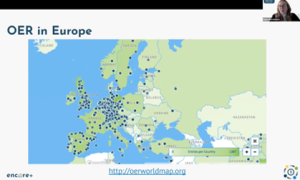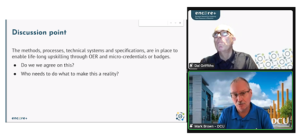The project ENCORE+ presents recent results of the research in a Network Event

The ENCORE+ project is financed by the European Commission through the call for Cooperation for innovation and the exchange of good practices – Knowledge Alliances (Erasmus+). An online Network Event was organized by the project last 26th September. In the session, the recent results of the research were presented: Foresight on the European OER Ecosystem 2030 and Credentialing Learning in the European OER Ecosystem.
Almost 40 participants from different European countries attended the session and participated in the discussion about the future of OER and the use of credentials in the field.
During the session the audience were invited to answer a question about future adoption of OER. The live results from the participants responses were discussed and compared with the full study. The general perception is that the OER will constitute a standard component in education and training services, but a political will is needed. Also, it is important to remark that the OER needs to be integrated in business models, in order to guarantee its sustainability.
Dai Griffiths, from UNIR, presented the report elaborated by UNIR iTED in the project (deliverable 5.4): Credentialing Learning in the European OER Ecosystem. As Dai explained, the report was based on a literature review and interviews with 10 experts on OER repositories who have experience with credentialing mechanisms.
The main conclusions of the report were discussed among the participants: on the one hand, it is clear that the assessment is identified as the core of the problem, as there is a clear divide in perception of formal qualifications and MOOCs. On the other hand, combining credentials and OER is not simple, and it is key to follow the progress of three current trends that are changing the landscape: reducing the granularity of awards; interoperable representation of learning achievement, and competence-based human resources management. Other aspects related to OER and credentialing were also discussed, such as the role of Higher Education institutions and governments; costs and business models, or infrastructures in place to enable life upskilling through OER and micro credentials of badges.


